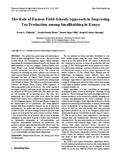| dc.contributor.author | Chimoita, Evans L. | |
| dc.contributor.author | Gatahi, Dennis M | |
| dc.contributor.author | Olila, Dennis O | |
| dc.contributor.author | Onyango, Joseph P.G | |
| dc.date.accessioned | 2015-01-28T07:11:34Z | |
| dc.date.available | 2015-01-28T07:11:34Z | |
| dc.date.issued | 2015 | |
| dc.identifier.citation | Chimoita, E. L., Maina, G. D., Olila, D. O., & Onyango, J. P. G. (2015). The Role of Farmer Field Schools Approach in Improving Tea Production among Smallholding in Kenya.Universal Journal of Agricultural Research (ujar), 3 (1): PP. 4 - 10 | en_US |
| dc.identifier.uri | https://profiles.uonbi.ac.ke/echimoita/files/published_paper_ujar2-10402894_2.pdf | |
| dc.identifier.uri | http://hdl.handle.net/11295/80099 | |
| dc.description.abstract | Tea
production, processing and marketing in
Kenya is under management of two sectors. The two sectors
include; Kenya Tea Development Agency which manages
approximately six hundred thousand small scale farmers and
multi
-
nationals sector for example Uniliver/Lipton teas,
James Finlay’s and George Williamson holdings manage
privately plantations and estates of tea. The volume and
frequency of plucking tea leaves enhances net revenue for
small scale tea farmers in Kenya. The main objective was
to
determine the rol
e of Farmer Field Schools extension
approach and eventual outcome tea production among small
scale farmers in Kenya.
The study assessed the trends and the
influence of Farmer Field Schools (FFS) approach in
addressing productivity of tea leaves. The study
employed
descriptive statistics and mean trends analysis to determine
the influence of FFS in tea production. The study sites were
six sub locations of tea growing areas. The sites were
purposively since they were pilot areas where the initial
farmer field
schools were collaboratively initiated by Kenya
Tea Development Agency (KTDA) and Uniliver/Lipton teas
for enhancement of tea production. The study gathered
primary data from sampled tea farmers by use of structured
questionnaires. Secondary data was sourced from the KTDA
archives records. Research findings revealed a positive trend
in green tea leaf production and as well as revenue. Further,
it was revealed that social positive effects such as farmers
willingness to participate in group activities and su
stainable
tea husbandry, promotion of self
-
mobilization and
interactive participation enhanced tea production. The
positive economic
-
agricultural productivity effects were; the
transfer and adoption of agricultural technologies
particularly in tea growing
that enhanced revenue, increased
access to knowledge and agricultural information | en_US |
| dc.language.iso | en | en_US |
| dc.publisher | University of Nairobi | en_US |
| dc.subject | Farmer Field Schools, Tea Green Leaf Yield, Tea Husbandry | en_US |
| dc.title | The role of farmer field schools approach in improving tea production among smallholding in Kenya | en_US |
| dc.type | Article | en_US |
| dc.type.material | en_US | en_US |

